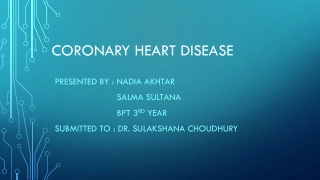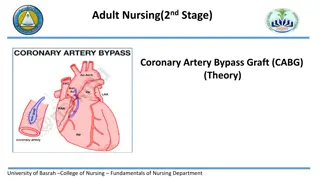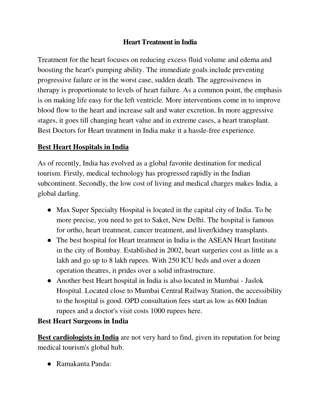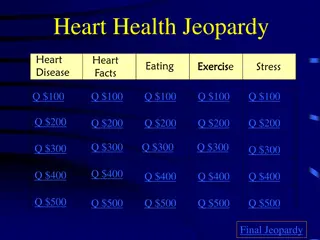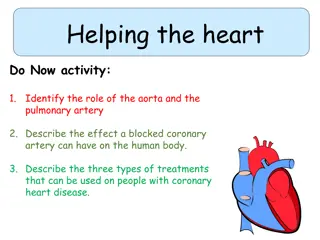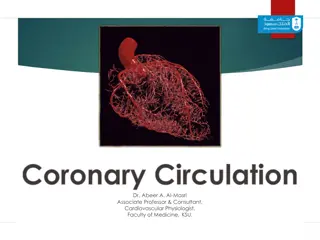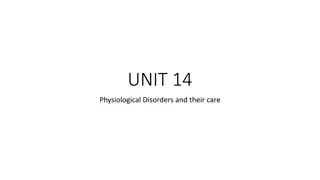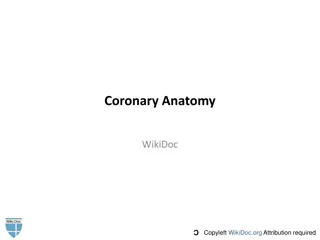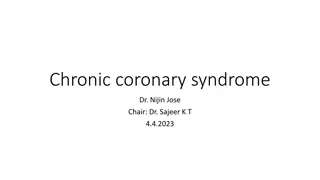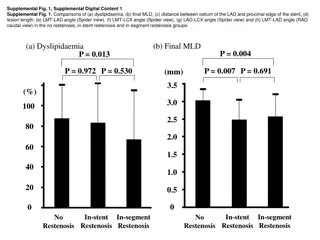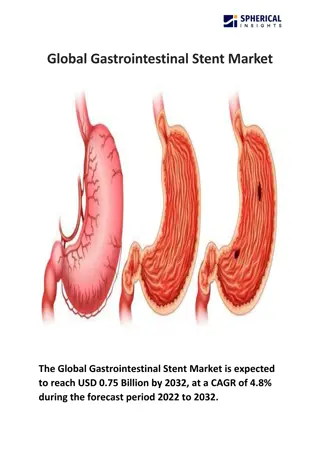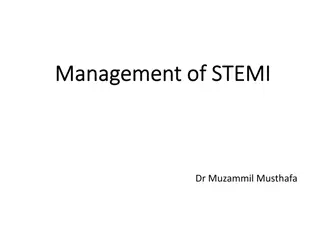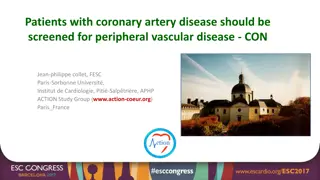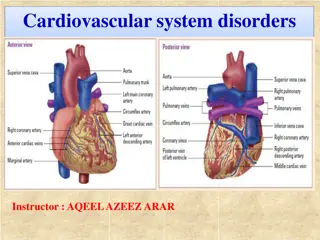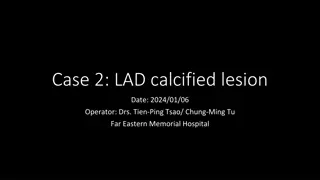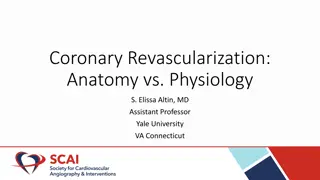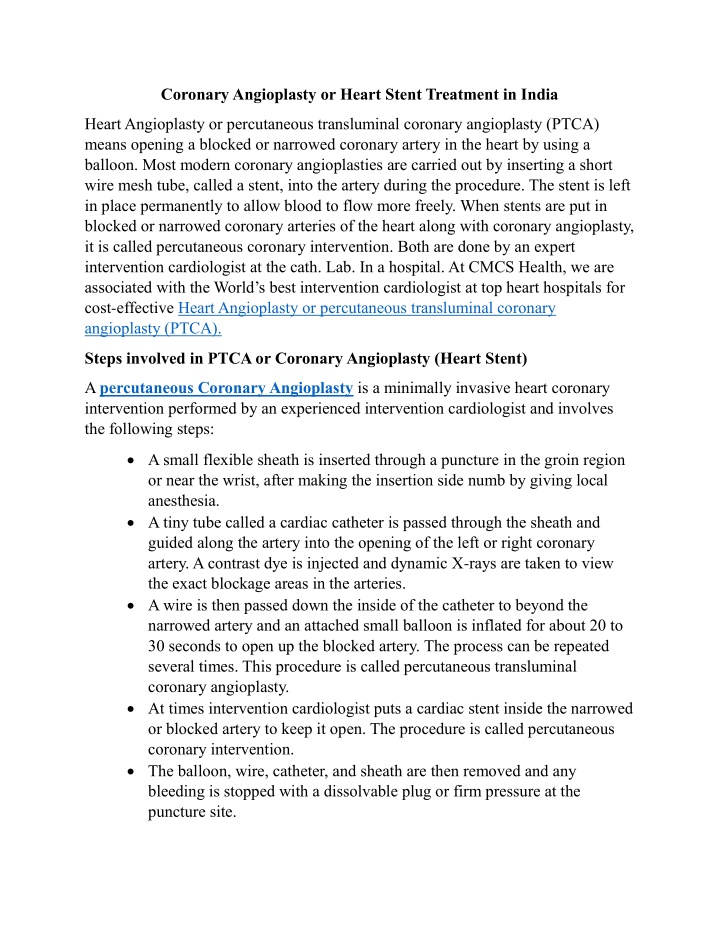
Coronary Angioplasty or Heart Stent Treatment in India
Heart Angioplasty or percutaneous transluminal coronary angioplasty (PTCA) means opening a blocked or narrowed coronary artery in the heart by using a balloon. Most modern coronary angioplasties are carried out by inserting a short wire mesh tube, ca
Download Presentation

Please find below an Image/Link to download the presentation.
The content on the website is provided AS IS for your information and personal use only. It may not be sold, licensed, or shared on other websites without obtaining consent from the author. If you encounter any issues during the download, it is possible that the publisher has removed the file from their server.
You are allowed to download the files provided on this website for personal or commercial use, subject to the condition that they are used lawfully. All files are the property of their respective owners.
The content on the website is provided AS IS for your information and personal use only. It may not be sold, licensed, or shared on other websites without obtaining consent from the author.
E N D
Presentation Transcript
Coronary Angioplasty or Heart Stent Treatment in India Heart Angioplasty or percutaneous transluminal coronary angioplasty (PTCA) means opening a blocked or narrowed coronary artery in the heart by using a balloon. Most modern coronary angioplasties are carried out by inserting a short wire mesh tube, called a stent, into the artery during the procedure. The stent is left in place permanently to allow blood to flow more freely. When stents are put in blocked or narrowed coronary arteries of the heart along with coronary angioplasty, it is called percutaneous coronary intervention. Both are done by an expert intervention cardiologist at the cath. Lab. In a hospital. At CMCS Health, we are associated with the World s best intervention cardiologist at top heart hospitals for cost-effective Heart Angioplasty or percutaneous transluminal coronary angioplasty (PTCA). Steps involved in PTCA or Coronary Angioplasty (Heart Stent) A percutaneous Coronary Angioplasty is a minimally invasive heart coronary intervention performed by an experienced intervention cardiologist and involves the following steps: A small flexible sheath is inserted through a puncture in the groin region or near the wrist, after making the insertion side numb by giving local anesthesia. A tiny tube called a cardiac catheter is passed through the sheath and guided along the artery into the opening of the left or right coronary artery. A contrast dye is injected and dynamic X-rays are taken to view the exact blockage areas in the arteries. A wire is then passed down the inside of the catheter to beyond the narrowed artery and an attached small balloon is inflated for about 20 to 30 seconds to open up the blocked artery. The process can be repeated several times. This procedure is called percutaneous transluminal coronary angioplasty. At times intervention cardiologist puts a cardiac stent inside the narrowed or blocked artery to keep it open. The procedure is called percutaneous coronary intervention. The balloon, wire, catheter, and sheath are then removed and any bleeding is stopped with a dissolvable plug or firm pressure at the puncture site.
The intervention cardiologist may decide to put more than one stent depending on the number of blockages. The patient is discharged from the hospital after 4 to 6 hours of observation post-PTCI. The different types of Heart stents: The most common types of heart stent used for percutaneous coronary intervention (heart coronary stenting) are: Bare metal stent: The commonly used coronary heart stents are bare metal stents which are made of stainless steel. This type of stent is now used only for minor angioplasties as scar tissue can grow around it and re-block the artery. Drug-eluting stent: These are the stents that are coated with a medication that keeps the artery lining free of scar tissue. This stent also reduces the risk of re-blocking of the coronary arteries but may lead to blood clots. Bio-Engineered Stent: This type of stent is not coated with any drug, which speeds up the healing process. This is made possible by the antibody on the surface of the stent, which attracts Endothelial Progenitor Cells (EPCs) that promote natural healing. The advantages of Bio Engineered stents are that they prevent early and late blood clots, and heal the cell lining faster as compared to the DES. Bioresorbable Vascular Scaffold (BVS): This stent is covered with a drug-eluting coat on a dissolvable scaffold platform that the body absorbs over time. The drug works in the system and prevents restenosis. The scaffold becomes a part of the body, which reduces the chances of re-blockage. But the flip side with this type of stent is that the healing process after this stent is quite slow. Dual Therapy Stent (DTS): These stents are so far the best heart stents that offer the same benefits as a DES and the medication on it has an active healing technology. They reduce the chances of inflammation and blood clots, actively promote the healing process, and prevent re-narrowing of the arteries.
Cost of heart stenting or percutaneous coronary transluminal intervention in India: The cost of PTCA and PTCI depends on the type and make of the stent, nos. of stents, and the overall health of the patient. The cost of PTCA and PTCI is much lower in India as compared to other countries. The latest diagnostic facilities, upgraded and state-of-the-art infrastructure, and unparalleled expertise of Indian intervention cardiologists have made India a first-choice destination for international patients seeking coronary heart stenting (PTCI). The average cost of PTCA and PTCI in India may range from 2000 USD to 4500 USD. Top 10 Hospitals for coronary angioplasty (PTCA) in India: 1.Medanta the Medicity, Gurugram, India. 2.Fortis Memorial Research Institute, Gurugram, India. 3.Artemis Hospital, Gurugram, India. 4.Max Super Specialty Hospital, New Delhi, India. 5.BLK Max Hospital, New Delhi, India. 6.Indraprastha Apollo Hospitals, New Delhi, India. 7.Gleneagle Global Hospitals, Mumbai, India. 8.MGM Healthcare, Chennai, India. 9.Nanavati max hospital, Mumbai, India. 10.Jaslok Hospital, Mumbai, India Five Best Intervention Cardiologists in India: 1.Dr. T S Kler, BLK Max Hospital, New Delhi, India. 2.Dr. Ashok Seth, Fortis Escorts Heart Institute, New Delhi, India. 3.Dr. K. K. Saxena, Indraprastha Apollo Hospitals, New Delhi, India. 4. Dr. Nikhil Kumar, Fortis Memorial Research Institute, Gurugram, India. 5.Dr Kuldeep Arora, Artemis Hospital, Gurugram, India. 6.Dr. Rajneesh Kapoor, Medanta The Medicity, Gurugram, India. Cmcs Health is a leading medical tourism company in India. We offer medical tourism services such as finding the right doctor, the right hospital, and cost estimation for medical treatment in India for foreign patients. Some of the main countries are Bangladesh, South Africa, Egypt, Kenya, Saudi Arabia, Ethiopia, Nigeria, Uganda, Zambia, Sudan, Dubai, Namibia, Iraq, and so on. We provide free medical assistance aplastic anemia treatment cost, stomach cancer treatment, sickle cell treatment cost, the best hospital for heart valve replacement, heart
valve surgery, arthroscopic surgery, bone marrow transplant cost, best liver transplant hospital, brain tumor surgery cost, cosmetic andplastic surgery, heart surgery, kidney transplant cost, spine tumor surgery, cancer treatment cost, lung transplant, liver transplant cost, top knee replacement surgeons, knee replacement surgery cost, top shoulder replacement surgeons, hip replacement surgery cost, best bone marrow hospital, etc. If you are searching for free medical and healthcare consulting to find the best hospitals and top doctors and surgeons in India for any treatment then contact us- Cmcshealth.com. Source:https://cmcshealth1.blogspot.com/2024/11/coronary-angioplasty-or- heart-stent.html

